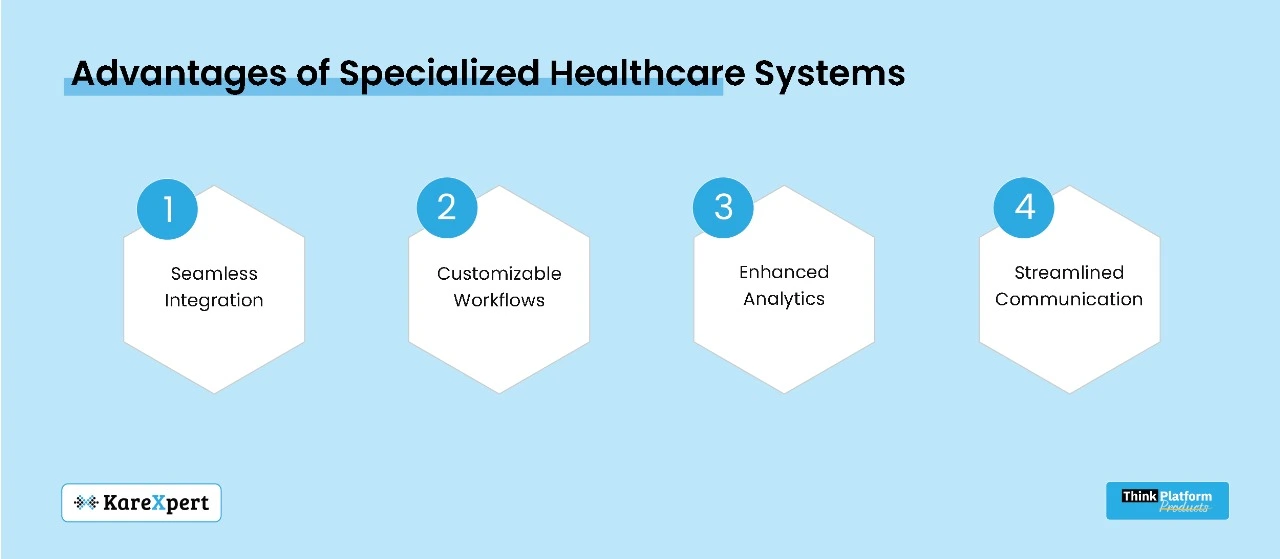Why Generalized Healthcare Systems Are Failing Specialized Departments

Introduction: The Move of Healthcare Towards Specialization
Healthcare is not a one-size-fits-all business anymore. With the advancement of medical science, specialized departments like ophthalmology, oncology, and cardiology require specific systems that cater to their distinct challenges. Generalized healthcare systems, created to meet sweeping needs, tend to fail at these specialized levels. This piece explores why generic systems fail specialty departments and how specialty-based solutions are becoming a necessity rather than a choice in the future of healthcare.
The Dangers of General Systems: An Overview
Generalized healthcare systems cover a broad range of functionalities, providing basic modules for patient management, billing, and diagnostics. Although these systems work for most general practices, they are not robust or well-suited to handle specialty workflows. Certain specialized departments may face significant inefficiencies. Below are reasons why these systems do not work:
Lack of Tailored Workflows
Specialized departments operate with highly specific workflows. Ophthalmology departments, for example, need imaging and diagnostic tools such as fundus photography and OCT scans. Generalized systems cannot natively handle such specific workflows, resulting in inefficiencies.
Inadequate Data Integration
General systems typically do not correlate specialized diagnostic tools with data platforms. For instance, the cardiology department would require integration with ECG devices, while oncology would need integration with chemotherapy planning tools. These integrations are often lacking, creating data silos that adversely affect holistic patient care.
Limited Customization
Specialized departments need systems that adjust to their particular requirements, ranging from appointment slots determined by the length of procedures to automatic reminders for follow-ups. Generalized systems have a rigid framework, making it challenging to adapt these features.
Compromised Patient Outcomes
Direct patient outcomes may be affected due to the inability to address specialized requirements. Generalized systems used in specialized settings commonly result in delayed diagnostics, inaccurate treatment plans, and ineffective monitoring.
The Increasing Complexity of Specialized Care
General systems can only do so much to accommodate specialized departments with their distinctive challenges. Consider these examples:
Ophthalmology: Advanced imaging tools, the ability to share real-time data on retinal scans, and predictive analytics related to diseases like glaucoma.
Oncology: Requires robust treatment planning systems that combine chemotherapy, radiology, and surgical schedules.
Pediatrics: Needs customized EMRs to monitor growth charts, vaccine status, and pediatric health-specific metrics.
These departments operate on diverse principles, creating a level of complexity that no single system can manage effectively.
Case 1: Ophthalmology and Transnational Systems
Ophthalmology stands out as a case in point on the inadequacy of generic systems to serve specific departments. Imagine a hospital that has implemented a generalized EMR for its ophthalmology unit:
Diagnostic Challenges
Generalized systems lack specific modules that can integrate sophisticated imaging techniques such as OCT or slit lamp photography. Ophthalmologists often resort to manual data entry, which is time-consuming and prone to mistakes.
Workflow Inefficiencies
Appointment scheduling in generalized systems does not consider varying procedure times, such as longer durations needed for laser surgeries compared to routine eye exams. This results in overbooking and patient dissatisfaction.
Data Discrepancies
Failure to share data in real time between diagnostic tools and EMRs leads to fragmented patient records. This undermines the capacity for rapid, informed decision-making.
Advantages of Specialized Healthcare Systems

Specialized systems overcome these limitations with:
Seamless Integration
Advanced tools, including imaging devices, diagnostic platforms, and lab systems, integrate seamlessly to deliver a holistic patient experience.
Customizable Workflows
Departments can customize systems for their specific needs, optimizing scheduling, data collection, and patient monitoring.
Enhanced Analytics
Predictive analytics tailored to specific conditions enable early diagnoses and preventative care, significantly improving patient outcomes.
Streamlined Communication
Specialized systems foster enhanced interdepartmental communication, ensuring accuracy and expediency in patient care.
Innovations in Technology That Drive Specialization
Healthcare technology is expanding pipelines for various types of solutions by department:
AI and Machine Learning: Early-stage risk identification through predictive models. For example, AI tools can drive diabetic retinopathy prediction in ophthalmology.
Cloud-Based Systems: Cloud-based systems allow access to data from multiple touchpoints, enabling real-time sharing and location-independent care of patients.
Telemedicine Integration: Facilitates remote consultations by specialized departments without compromising quality.
These advancements allow specialized departments to operate effectively and optimally without depending on generalized systems.
Navigating the Difficulties of Transitioning to Specialized Systems
Although the advantages of specialized systems are evident, moving from generalized systems is challenging:
Cost Implications
Smaller hospitals may be deterred by the higher upfront costs of specialized systems. However, the upfront investment is a small price to pay for the long-term gains.
Training and Adoption
Staff require training to adjust to new systems. Investing in user-friendly interfaces and ongoing support can facilitate this transition.
Data Migration
Moving from generalized systems to specialized systems involves migrating massive amounts of data. Choosing the right vendors is crucial to ensure a smooth transition.
A Future Directed by Specialization
With ongoing advances in the healthcare field, the demand for specialization is becoming prominent. To improve efficiency, patient satisfaction, and clinical outcomes, hospitals and clinics need tailored systems to serve their unique needs.
While generalized systems met needs during the initial phases of digitization, the future lies in specialized, departmental solutions. The transition doesn’t only represent a technological upgrade but also a move towards improved healthcare for everyone.
Conclusion: The Need for Customized Solutions
Generalized healthcare systems falter in specialized departments. Tailored systems allow healthcare providers to customize their tools to better meet the unique needs of each department, enhancing efficiency and results.
Specialized systems ensure that providers keep up with technology while delivering care that sets the benchmark for quality and precision. The healthcare industry must leave behind the “general” and move toward the “specialized.”
